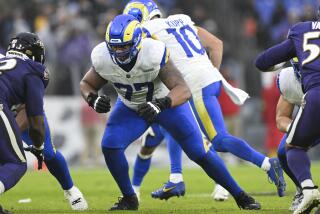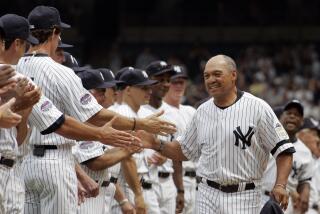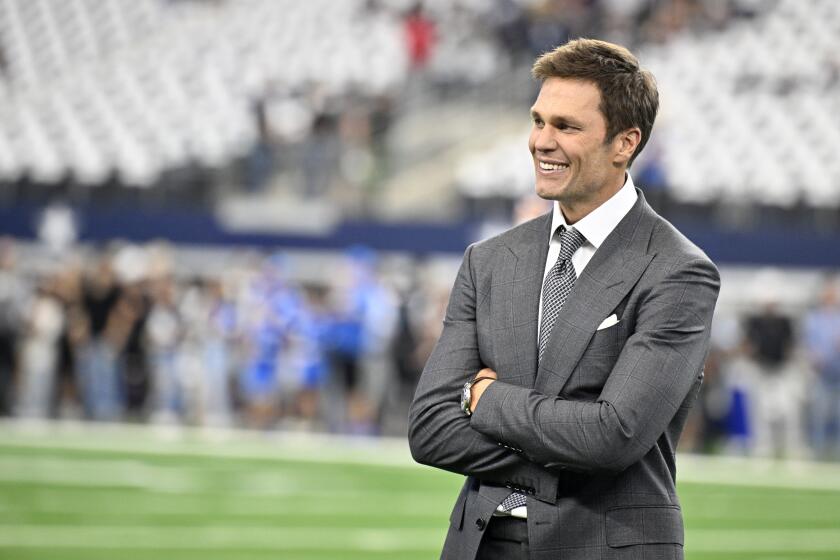Old School Finally Out for Jackson
YUMA, Ariz. — Baseball can be stuffy. It gets set in its ways. At least its people do.
You have heard all the theories, for example, about how right-handed batters are weak against right-handed pitchers.
If you haven’t, Darrin Jackson has.
Only for all of his career.
Early in his major league career, when he was struggling for playing time with the Chicago Cubs, he went to see Manager Don Zimmer.
“I asked him what it would take to be an everyday player,” Jackson recalled.
Zimmer, understand, is as old-school as Calvin Coolidge. He probably drives a black Ford. He can’t see past the tobacco chaw in his cheeks.
“He told me he didn’t think I could hit right-handers,” Jackson said. “He didn’t have any proof. He just felt that way. He said he’d play me against the guys he felt I could hit. I told him, ‘Zim, until I’m proven wrong, I’m gonna believe I can play every day at this level.’ He told me that was the way he wanted me to feel.”
Believing that he could and feeling the way he should feel did not, however, translate into more playing time.
“I was just stuck with that kind of a stereotype,” Jackson said. “I played against right-handers through my whole career in the minor leagues. I played against mostly right-handers and I got to the big leagues hitting right-handers. That was the thing that got to me.”
He got to the major leagues and became, at a young age, a pinch-hitter and defensive specialist.
“I’d get spot at-bats in the late innings,” he said, “usually against a closer. You can look kind of feeble when you’re getting one at-bat against a right-hander for every 10 against a left-hander.”
His biggest year for the Cubs, at least in terms of playing time, came when he appeared in 100 games in 1988. However, he had only 188 at-bats. This was like being a regular on the field but an irregular in the batter’s box.
When Jackson, now 28, came to the Padres in 1989, it looked like more of the same. He saw spot duty in 1989, started 1990 in Las Vegas and saw more spot duty when the Padres recalled him later in the year.
It was looking like he would be a career extra man, if, indeed, there was even much left of his career.
In the spring of 1991, when the Padre outfield situation seemed so wide open, Darrin Jackson knew there was a solution.
“He told me if he got 300 at-bats he’d hit 20 home runs,” teammate Tony Gwynn said. “I looked at the back of his baseball card and saw that he hit 23 home runs in Iowa (in 1987) and I thought then that he probably could.”
Part way through the season, when Jackson was still an irregular, Gwynn needled him about his home runs.
“He got on me, said I was stealing money,” Jackson laughed. “We got going head to head on home runs. At the time, I think we both had two.”
Jackson was about to get an opportunity, though his bat had nothing (or little) to do with it.
“We needed defense in center field,” said Manager Greg Riddoch, “but he was hitting so well we started matching him up against right-handers he had hit well against. It got to the point where his defense was so good we let him hit against everybody.”
Riddoch might have started his career as an old-schooler, but he is young and he has changed with the times. He works extensively with computers and deals with reality rather than perceptions.
When the season was over, he could see that Jackson had 21 home runs in 359 at-bats. His numbers would also tell him that Jackson hit .260 against right-handers and .264 against left-handers. Jackson hit 10 of his home runs in 196 at-bats against right-handers and 11 in 163 at-bats against right-handers.
Even more interesting, Jackson was fourth in the National League in home run ratio among hitters with more than 350 at-bats. He had one homer every 17.1 at-bats, a blip behind teammate Fred McGriff’s one homer per 17.0 at-bats. He was also behind Kevin Mitchell (13.7) and Howard Johnson (14.8) and ahead of Matt Williams (17.3).
So now Darrin Jackson is what he always felt he could be. He is a starter. He might go to the plate more than 500 times, for a change.
“Hey,” Riddoch said, “he’s not playing center field because he hit 21 home runs. He’s playing center field because he can play center field. Home runs are gravy.”
Gravy tastes good, but Jackson is not inclined to enjoy it.
“I don’t want to get comfortable,” he said. “It’s kind of in me to bust my butt to prove I can play.”
And Tony Gwynn won’t let him relax. He was hitting, as Gwynn put it, a buck 96--that’s .196 to us--a couple of weeks into spring training with nary a home run.
“I get him going by ragging on him,” Gwynn chortled. “I told him his streak of hitting at least one homer every spring was over. He hit a home run the next game and his average was up to .268 after three games.”
One thing is certain, however. Tony Gwynn will not be challenging Darrin Jackson to any home run hitting contests.
Not any more. Not that Mr. Jackson has shed that stodgy stereotype.
More to Read
Go beyond the scoreboard
Get the latest on L.A.'s teams in the daily Sports Report newsletter.
You may occasionally receive promotional content from the Los Angeles Times.










